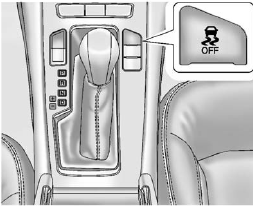Traction Control System (TCS)
The vehicle has a Traction Control System (TCS) that limits wheel slip.
The system operates if it senses that one or both of the front wheels are slipping or beginning to lose traction. When this happens, the system reduces engine power and/or applies brake pressure to the slipping wheel(s).
The system may be heard or felt while it is working, but this is normal.
TCS automatically comes on whenever the vehicle is started. To limit wheel slip, especially in slippery road conditions, the system should always be left on. But, TCS can be turned off if needed.
 flashes to indicate that TCS is
active. See Traction Control System
(TCS)/StabiliTrak® Light for more information.
flashes to indicate that TCS is
active. See Traction Control System
(TCS)/StabiliTrak® Light for more information.
If there is a problem detected with TCS, SERVICE TRACTION CONTROL is displayed on the Driver Information Center (DIC).
See Ride Control System Messages. When this message
is displayed and  comes on and
stays on, the vehicle is safe to drive
but the system is not operational.
comes on and
stays on, the vehicle is safe to drive
but the system is not operational.
Driving should be adjusted accordingly.
If  comes on and stays on, reset
the system.
comes on and stays on, reset
the system.
To reset:
1. Stop the vehicle.
2. Turn the engine off and wait 15 seconds.
3. Start the engine.
If  still comes on and stays on, the
vehicle needs service.
still comes on and stays on, the
vehicle needs service.
Notice:
Do not repeatedly brake
or accelerate heavily when TCS is
off. The vehicle's driveline could
be damaged.

TCS can be turned off by pressing
and releasing the TCS/StabiliTrak
button. When TCS is turned off,  comes on, and the appropriate DIC
message also displays. See Ride
Control System Messages. With TCS turned off, the
system does not limit wheel slip.
comes on, and the appropriate DIC
message also displays. See Ride
Control System Messages. With TCS turned off, the
system does not limit wheel slip.
Driving should be adjusted accordingly. See Traction Off Light for more information.
Press and release the TCS/StabiliTrak button again to turn the system back on.
It may be necessary to turn the system off if the vehicle gets stuck in sand, mud, or snow and rocking the vehicle is required. See If the Vehicle Is Stuck for more information. See also Winter Driving for information on using TCS when driving in snowy or icy conditions.
Adding non-GM accessories can affect the vehicle performance. See Accessories and Modifications for more information.
See also:
Rear Window Lockout
Rear Window Lockout
This feature prevents the rear
passenger windows from operating,
except from the driver position.
Press o to activate the rear
window lockout switch. The LED (A)
comes ...
Instrument Panel Fuse Block
The instrument panel fuse block is
located in the instrument panel, on
the driver side of the vehicle. To
access the fuses, open the fuse
panel door by pulling down at
the top.
Press in o ...
Volume Control
VOL/ (Volume/Power): Turn to
adjust the volume.
(Phone/Mute): For vehicles with
OnStar®, press and hold to mute
the infotainment system. Press and
hold again, or turn the VOL/
knob t ...


